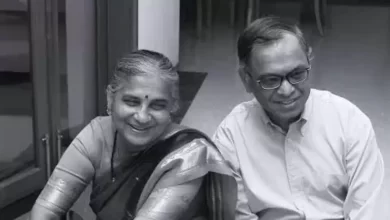Saif Ali Khan’s Kaalakaandi: Darlings, this is what a desi dark comedy looks like

Prior to releasing the film Darlings, Netflix attempted to educate the audience about dark comedies having the cast and director explain the trappings of the subgenre in great detail. It would be a noble gesture, if it wasn’t so condescending. For one, why would you assume that paying Netflix subscribers who probably binged five seasons of Breaking Bad on the service wouldn’t know what a dark comedy is? And secondly, even if they don’t know the proper terminology, you could safely bet that they’ve watched some kind of dark comedy in their lives, can’t you? For instance, Netflix didn’t deploy this strategy for Sudhir Mishra’s Serious Men, nor did it attempt to school viewers about Westerns before releasing Thar.
It was an odd move, engineered purely to imply that Darlings is some kind of path breaking experiment for a beleaguered Bollywood. But forget being the early mover that everyone involved seems to be suggesting that it is, Darlings, ironically, has no business calling itself a dark comedy at all. There isn’t a single scene where the film isn’t actively struggling with the complexities of tone that the best black comedies navigate so elegantly.
And this gives us a great excuse to talk about one of them, the (mostly forgotten) 2018 Saif Ali Khan-starrer Kaalakaandi, written and directed Delhi Belly’s Akshat Verma and released when Saif was at the peak of his zero-Fs-to-give era. After briefly flirting with the idea of starting a creative revolution in mainstream Bollywood, Saif was forced to stop scheming after the experiments never yielded ‘results’. And instead of appreciating this risk-taking attitude, the popular perception is that after a string of flops, Saif crawled back with tail between his legs, desperate to regain entry into the audience’s good books. And for what? A cameo in Dil Bechara that you’d completely forgotten until just now?
But Kaalakaandi doesn’t deserve to be forgotten. It’s far the best film of what I like to call the UnSaif phase, dripping with morbid humour, boasting a playfully complex plot that doesn’t allow the viewer to disengage for even one second, and an ending that drives home the film’s central theme through the thickest of skulls. Literally.
Chaos theory comes alive as three storylines collide over one eventful night in Mumbai. Saif plays a banker who has just been told that he has stomach cancer and a couple of months to live; Akshay Oberoi plays his brother Angad, who’s getting cold feet hours before his wedding; Sobhita Dhulipala and Kunaal Roy Kapur play a young couple who go out partying one last time before Dhulipala’s character flies away (maybe forever?); and Vijay Raaz and Deepak Dobriyal star as two bantering goons bitter about their station in society. None of these characters would probably meet each other if they weren’t in a movie, but over the course of the night, their lives become intertwined so intimately it’s as if Sima Aunty herself arm-wrestled destiny into submission.
Unlike Darlings and JugJugg, Kaalakaandi finds humour in unlikely situations, instead of pausing the drama and inserting Maniesh Paul (or Vijay Maurya) as the comic relief. This isn’t a dark thriller with comedic elements, it’s a dark comedy. And Verma’s script immediately sets the tone, avoiding the go-to Bollywood move of altering between heavy-handed drama and broad humour, sometimes in the same scene. But its biggest achievement is the ease with which it is able to generate empathy for Saif’s blank slate of a character.
While the film lets you know about his cancer diagnosis in scene one, we learn nothing of worth about him until the third act. His name, believe it or not, is revealed in the film’s final moments — Jerrod Carmichael essentially used the same narrative in his tremendous new standup special Rothaniel.
For basically an hour, we’re expected to go along for the ride on goodwill alone, and we do. We believe the protagon when he tells the doctor in the opening scene that he’s a good person. That’s enough for us. And a lot of it is down to Saif’s innate likability as an actor. A dicier screen presence would’ve thrown the entire movie out of whack. Ayushmann Khurrana, for instance, would’ve required the backstory in the first act to win the audience over. But with Saif, Verma is able to roll the dice and reserve the emotional wallop until that lift scene.
Dressed like a clown and experiencing early bouts of an inevitable downer, Saif’s character bares his soul to a stranger. Magic realism blends beautifully with old-fashioned movie romance as the two characters gaze into each other’s eyes and find a connection. “The lift, it’s breathing. It’s like a living thing,” Saif’s character says, as graffiti falls from the skies and an ocean wells around his ankles. They hold hands, and with tears in his eyes, the protagon talks about the regrets of his life — the son who doesn’t live with him, the family he doesn’t have, the sense of dissatisfaction that will probably haunt him for the rest of his (numbered) days. It is in this scene that the reality of his situation finally hits him. “I don’t want to go,” he says.
This isn’t supposed to be a funny scene; it’s actually quite moving. Saif’s character is definitely going to die. At no point does Kaalakaandi suggest that there’s a magical cure waiting for him around the corner. This is what makes his arc so engaging. Underneath the stylised violence and the irreverent fun, Kaalakaandi is the story of a dead man walking (high on ecstasy, wearing a frilly scarf stolen from a hooker, and his hair tied up with hair-clips meant for little girls). Even the moments of levity are tinged with sadness; the characters don’t suddenly forget their trauma as they move from scene to scene.
In one of the film’s more lighthearted moments, the protagon quotes a line from Sanjeev Kumar’s Angoor, and pleased that his companion was able to catch the reference, says, “Zamana hi kuch aur tha.” You can’t help but sympathise. Kaalakaandi is a four-year-old film, but look around at how drastically the world has changed since then, and four years can feel like a lifetime ago. They don’t make them like this anymore.
Post Credits Scene is a column in which we dissect new releases every week, with particular focus on context, craft, and characters. Because there’s always something to fixate about once the dust has settled.







